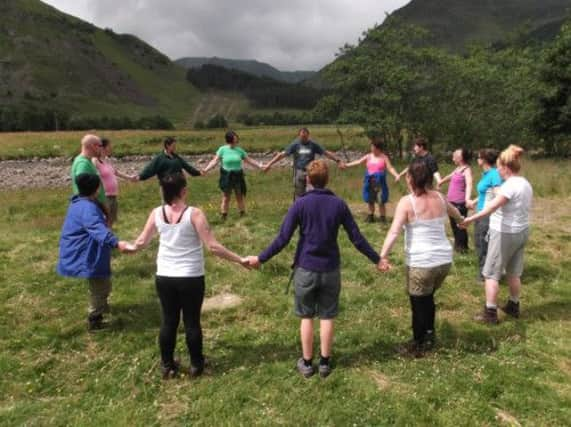Tapping skills to fulfil women’s lives


I would like to tell you the story of one of Venture Trust’s participants. Let’s call her “Hope” (clichéd, I know, but go with it for now). Hope grew up in a violent and abusive household; both her parents misused alcohol and drugs, and aged eight she was taken into local authority care. As she grew up, she was moved to several different homes, passed from “key worker” to “trusted professional”. Lacking confidence, without much in the way of qualifications, no friends or family to speak of, Hope struggled with homelessness when she left care and couldn’t get into a job or training. She moved in with a boyfriend, and they had a child upon whom Hope doted. But, in the face of violent domestic abuse, she was forced to flee her home and see her daughter – in turn – taken into care.
Oh, and Hope committed a number of offences, and spent six months in prison.
Advertisement
Hide AdAdvertisement
Hide AdIt’s funny (if that’s the word) how that last sentence changes society’s view of Hope – it labels her an “offender”: a criminal, a law breaker. A perpetrator, nothing more.
Causes of offending are multiple and varied
The risk is that these labels mask all those other things about Hope – that she’s also a loving mother, also an isolated and vulnerable young woman, also a multiple victim of violent crime and domestic abuse. Or, to put it another way, she’s an individual. An individual with complex needs and facing chaotic circumstances in her life, but still an individual.
A person who desperately wants her child back, who wants to find work and stay out of trouble – but who doesn’t quite know how to go about it. A person in need of support to develop essential core life skills, discover her sense of aspiration and re-take control of her life.
This is absolutely not to excuse her offending, nor to refute the idea that for some individuals, prison is the appropriate punishment for their crimes. The point is that the causes of offending are multiple and varied, but often boil down to individuals’ abilities (or inabilities) to cope with and overcome challenges in their lives, and to make effective choices in difficult circumstances.
Scotland (and, to a lesser extent, England and Wales) is slowly waking up to the fact that society’s response to women’s offending needs to change. The female prison population in Scotland has doubled in the past ten years, many women in the system are frequent reoffenders, and short-term prison sentences have little or no impact on reoffending (70 per cent of women who received a sentence of three months or less are reconvicted within two years). Last month, the first public statement by Scotland’s new inspector of prisons (and former Police Chief Constable) David Strang was quite clear: “We send too many people to prison, particularly for short sentences.”
Individuals have the capacity to change
Scotland’s watershed moment on this issue came in April 2012, when former Lord Advocate Dame Elish Angiolini launched the final report of Scotland’s first ever Commission on Women Offenders. The Report concluded that “a radical reform of existing systems and working practices was required [in the criminal justice sector]” and recommended a suite of practical proposals to do so. Cornton Vale, Scotland’s only female prison, is to be closed, and “services need to be tailored to the multiple and complex needs of women offenders to achieve reductions in reoffending and better outcomes for local communities”.
Having launched specific programmes for women in the criminal justice system in 2009, Venture Trust was one of few agencies ahead of the game. Based upon a belief that all individuals have the capacity to change, Venture Trust’s Next Steps programme offers women time, space and intensive support away from their day-to-day circumstances, where they can unlock the skills and motivation they need to make positive changes in their lives. And the quotes below, from a number of women who have taken part in our provision, show that – actually – there is rather a lot of “Hope” around:
“My life’s changed for the better, I’m healthier, happier, thriving. I’ve got a career now, I can see a future.”
Advertisement
Hide AdAdvertisement
Hide Ad“[If I hadn’t come on the Venture Trust course] I’d be in jail, I’d be sitting in Cornton Vale. There’s no two ways about it.”
“It’s made me a better person. It’s made me more determined to help other people. That’s a determination that I’ve got now, to help other people, to help other people to achieve their goals.”
“My relationships with other people have changed, because people are seeing a change in me. And they’re willing to spend time with me now, whereas before, they just didnae want to know, cos they thought you were trouble. It’s been a total change of attitude, I’m nicer to people now, treat people with more respect.”
At Venture Trust, we’re aiming to support 48 women this year, each of whom has access to over 100 hours of intensive, personalised support. It costs us around £12 per hour to offer this support; relatively little compared to the long-term costs of offending, imprisonment, children in care and unemployment.
• Malcolm Jack is a member of the senior management team at Venture Trust. To support Venture Trust’s work helping women to escape cycles of offending, go to www.venturetrust.org.uk/supportingwomen